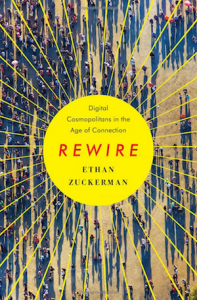The book “Rewire: Digital Cosmopolitans in the Age of Connection” written by Ethan Zuckerman, co-founder of Global Voices, examines why the extraordinary potential for communication that technology brings doesn't necessarily translate into stronger connections between people. In “Rewire”, Zuckerman describes in particular the important role translators play in facilitating a better understanding of world events in context.
“Rewire” explains that despite the remarkable progress that has been made in information technology, with the entire world accessible to us in one click, the fact remains that the web that we use is still unintegrated and limited to those spheres with which we are most familiar.
In order to resolve this problem of self-segregation, Zuckerman proposes a few steps to “reconnect/rewire the web”. One of these suggestions is to encourage the discovery of new spheres of thinking by following what he refers to as “bridge figures” or “curators”.
Serendipity
One of the concepts that Zuckerman discusses in depth is serendipity. He argues that our consumption of content on the Internet tends to revolve around the same media outlets. To expand our intake of news online, we need to allow serendipity to guide us towards a more diversified media consumption.
The concept of serendipity is not easy to define. It is what happens when we make new discoveries through a confluence of fortunate events. Many important scientific achievements have been serendipitous, such as the invention of penicillin, the Post-it, the Rosetta Stone, and Velcro.

The Rosetta Stone in the British Museum, discovered accidentally by a French Stoldier during the Campaign in Egypt carried out by Napoleon Bonaparte – Wikipedia CC-BY-NC
Hubert Guillaud, editor-in-chief of internetactu.net, a website dedicated to news, current events, and innovations on the World Wide Web, wrote the following comment on an article by Christian Faure: “How to quickly know what you don't know:” [fr]:
J’aime aller dans les librairies que je ne connais pas et quand elles me perdent, c’est-à-dire quand je ne reconnais rien de ce que je connais dans leur rayon, alors je me dis qu’elle semble intéressante. Je vais souvent au rayon des essais et mon plus grand plaisir est d’y découvrir ce que je ne connais pas et plus il y en a, qui semble de qualité, et plus ça m’intéresse en fait ou plus je considère la librairie. Ca ne signifie pas qu’en faisant ainsi on ne procède pas pour autant par induction, effectivement. Nous avons tous une tendance forte à l’induction, mais peut-être plus parce que nous avons toujours un avis singulier (par essence), une première impression, qu’une expérience multiple. J’ai même tendance à penser que concevant le monde ainsi, nous avons forcément tendance à construire des outils dans lesquels nous nous reflétons ou qui voient le monde tel qu’on le voit. Nos outils d’agrégation, nos outils de personnalisation ont tendance à voir le monde par la lorgnette où on le regarde
I like to go to unfamiliar bookstores, and when I get lost in them, meaning, when I don't recognize anything on the shelves…that's when it get's interesting. I often go to the essay section and my greatest pleasure is to discover something previously unknown to me. The more quality new material I discover, the more my interest is piqued, and in fact I hold the store in even higher regard. This doesn't actually mean that by doing this that one doesn't end up drawing general conclusions any way. We all are predisposed to draw larger conclusions, but perhaps we do this more because we each have our own unique point of view (essentially), a first impression, rather than a varied experience. I even have a tendency to think that viewing the world like this, we inevitably tend to create tools through which we reflect ourselves and our way of seeing the word. Our web aggregation and personalization tools have a tendency to see the world through the prism of our perspective.
Sylvie Catellin, an associate professor of information technology and communication, explains how serendipity is an important factor in all discoveries and is also a “tool of reflexivity” [fr] that gives rise to the conditions for it to occur:
L’intuition scientifique est définie comme une idée unifiante ou clarifiante, laquelle surgit dans la conscience en tant que solution d’un problème qui préoccupe intensément le chercheur. Elle survient de manière inattendue, de quelque étrange univers extérieur, lorsque l’on est absorbé par des problèmes urgents ou bien pendant le sommeil. Parmi ces conditions, il faut notamment retenir le profond désir de savoir, le stock de connaissances en mémoire reliées au problème, le sentiment de liberté, l’aptitude à briser la routine, la discussion du problème avec d’autres chercheurs [..] C’est peut-être justement lorsque les scientifiques réfléchissent à leur expérience de la créativité et de la sérendipité que les sciences dites « dures » sont les plus susceptibles d’entrer en dialogue avec les humanités, les arts, les sciences humaines et sociales, devenant plus réceptives à leurs discours et à leurs approches. La réflexivité (en supplément à la sérendipité) implique la liberté et l’émancipation par rapport aux dogmatismes épistémologiques.
Scientific intuition is seen as one unifying or illuminating idea, which comes about as a solution to a problem that engrosses the researcher. It emerges unexpectedly from some strange parallel universe, while one is consumed by pressing problems, or sleeping. In these conditions, it is essential to have the following: the profound desire to know the answer, the arsenal of memorized facts that are related to the problem, a sense of freedom, the ability to break through routine, the discussion of the problem with other researchers […] It is perhaps precisely when scientists reflect on their experiences of creativity and serendipity that the so-called “rigid” sciences are most likely to find common ground with the humanities, the arts, the human and social sciences, becoming more receptive to their speeches and their approaches. It is there that reflexivity (in conjunction with serendipity) involves freedom and breaking free in the face of dogma and epistemology.
Cosmopolitanism
Cosmopolitanism is a concept that is fairly limited on the French-speaking Web. In the most general sense, it indicates an interest in foreign populations and countries. What this definition leaves out is the fact that the concept of cosmopolitanism also embraces the idea of belonging to a community of origin that has its own unique qualities. It is often discredited as a utopian concept, those who believe in the idea of a global citizenry are often in favor of a world that is unified on the basis of collaboration rather than competition.
This ideological approach to the world is not Zuckerman's aim. Instead, he emphasizes the need to become conscious of our narrow consumption of media and to open ourselves to other spheres of thinking in a progressive manner.
Rodrigue Coutouly, contributor on the French-language website Les échos, notes that in light of the growing complexity of human societies, [fr] it would perhaps be wise to try to open oneself as much as possible to diversity:
Il est devenu impossible de comprendre de l'extérieur, des organismes ou des sociétés humaines travaillés par des enjeux de plus en plus complexes et contradictoires, ayant accumulé des compétences et des modes d'actions foisonnants et d'une grande diversité.[..] La masse sans cesse renouvelée d'informations brutes finit en effet pour empêcher toute tentative cohérente d'analyse lucide des événements, elle renforce les stéréotypes et ne permet pas une compréhension distanciée, elle n'autorise aucune prise de hauteur, de prise de recul, dans le temps et dans l'espace.[..] (Il est primordial) de relier le particulier au général, le local au global.
It has become impossible to understand things from an outside perspective. To examine organizations, or societies that are challenged by increasingly complex and conflicting issues, after having built up a multitude of skills and modes of behavior and a great deal of diversity. […] The perpetual stream of uncurated news ends up preventing any coherent attempt to analyze events. It reinforces stereotypes and does not allow for objective understanding. There is no room for a broader perspective or taking a step back in time and space. […] (It is instinctive) to draw conclusions from the specific to the general; from local to global.
German Sociologist Ulrich Beck, who coined the term “risk society” and who and advocates for a cosmopolitan society, argues for a new face [fr] of cosmopolitanism:
Le cosmopolitisme est la prise de conscience du destin commun qui lie désormais toutes les parties du monde dans le partage des mêmes risques. [..] Il ne s’agit donc pas là d’un cosmopolitisme qui vient d’en haut comme celui incarné par les Nations unies ou par la Cour internationale de justice. Cela ne veut pas dire non plus que tout le monde devient cosmopolite, amateur de diversité culturelle ou polyglotte, ou que nous sommes tous conscients de ce phénomène. Cela signifie simplement qu’il y a de fait une cosmopolitisation qui vient d’en bas et qui change notre vie quotidienne, notre mode de consommation, notre vie politique, ou nos relations à l’intérieur même de nos frontières nationales. On peut parler en ce sens d’un « cosmopolitisme banal ». [..] Le risque global peut être l’une des forces aptes à produire des institutions cosmopolitiques capables de surmonter les intérêts appréhendés seulement à l’échelle nationale. Car les gens et les États peuvent apprendre qu’il faut résoudre les problèmes nationaux dans une société cosmopolitique. Cette perspective cosmopolite est réaliste ; c’est le nationalisme qui dans ce contexte est idéaliste : il regarde en arrière et n’apporte pas de vraies réponses aux sociétés.
Cosmopolitanism is the awareness of a common destiny that, from this moment on, unites all parties of the world in sharing the same risks. […] Therefore, it is not a question of a cosmopolitanism that is imposed by some authority, as embodied by organizations such as the UN or the International Court of Justice. Nor does it mean that the world is becoming cosmopolitan and more accepting of cultural diversity and increasingly polyglot, or that we are all more aware of this shift. It simply means that there is in fact, a cosmopolitan movement that is emerging from the ground up and that is changing our everyday lives, our habits as consumers, our political lives, even how we view things within our own borders. You can sort of call it an “everyday cosmopolitanism” […] The overall risk may be one of the forces that is capable of producing cosmopolitan institutions that can overcome those interests normally understood only on the national level. Because people and countries can learn that national problems need to be resolved in the context of a cosmopolitan society. This cosmopolitan perspective is in fact realistic, it's nationalism in this context that is idealistic. It looks to the past and doesn't offer any real solutions to societies.








1 comment